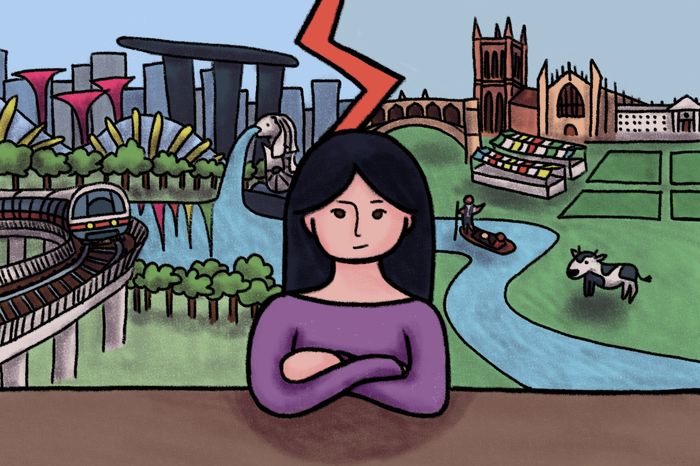Overcompensating or culturally in touch? On being an international student
Feelings of being closer to home whilst afar causes international students to magnify or mask their culture, but there is beauty in the middle ground, argues Maria Eduarda Paixao

A friend recently told me that being at Cambridge feels like a strange eight-week gap from her ‘real life’ back in Spain. It is a curious feeling being far away from your home country. As international students, we often talk about the ways we compromise to conform to the norms set by British culture: perhaps we change our accents, start calling fries ‘chips’ and chips ‘crisps’, slowly pick up British slang and, because of the burgeoning reality-TV culture, learn who Dani Dyer is. The paradox often left undiscussed is how many of us feel closer to our culture whilst being geographically so far away from what we once called home.
“The paradox often left undiscussed is how many of us feel closer to our culture whilst being geographically so far away”
In Brazil we have this saying “saí do Brasil, mas o Brasil não sai de mim”: ‘I left Brazil, but Brazil has not left me’. Typically jested after a family member returns from travelling abroad - when you leave Brazil, you become more Brazilian. I suspect this saying applies to all international students to some degree. Personally, I feel like I keep hammering on about Brazil to everyone I meet. It almost feels performative. The saying never proved truer: ‘you only know you truly love something, when it’s gone’. I had never given Brazil this much thought before I left. Simple gestures like giving people two kisses as greetings were natural, and having a ‘cafézinho da tarde’ was a longstanding tradition. This is the beauty of different cultures, each with their own traditions and customs, but, for international students far from their cultural comfort zones, this engenders an internal conflict. The question becomes, do I mute my former self to ‘fit in’ or do I become a louder version?
Maybe it’s a result of our feelings of alienation, not fully understanding certain English customs. Like a ‘tatu-bola’ we hide in our shells, not in the sense of being shy but rather shielding ourselves from partaking in certain English practices in fear of losing a piece of our culture; of becoming ‘gringo’. It might be silly but I, for one, refuse to eat beans on toast no matter how good it supposedly is. In a bid to still maintain our connection with home we overcompensate, mentioning our country every five seconds, clinging on to a past which is no longer coherent with our present.
This rings true for national students too, when you go home it is no longer the same place you left. You’re not the same person that left it. For international students, some of us cope by becoming louder versions of ourselves; more Brazilian, more Colombian, more Spanish or Indian. Clinging to the familiarity of our home culture in fear of accidentally changing too much and feeling alien when we finally go back for the Christmas break.
The other route we can take in this social minefield is turning down the dial, muting our former selves to conform. As international students we adhere to the actions previously explained, changing accents, using British slang and so forth. In exchange, we make friends and socialise with other students. Yet, college students are not the only ones that mute themselves to conform. The recent US elections are an extreme case of this where, as per Richard Luscombe in the Guardian, Trump’s victory was largely fuelled by support from Latino and Hispanic voters, primarily men. A significant factor in this was that Latinos in the US feel some shame towards their heritage, distancing themselves from it, under the guise of being worried about slackened border controls and the ‘bad’ Latinos coming to the US. There is a controversial psychological phenomenon for this, ‘the mutt complex’ which takes on a racial dimension, delineating how countries in Latin America feel their cultures and histories are less than the ‘West’. So, they mute their heritage and culture, to appeal to the cultural hegemony they are inserted in. This is, therefore, not a mere college experience – it’s universal. Alternatively, perhaps the other side of the dial, of constantly explaining how things are back at home, is a way of representing our underrepresented countries in a positive light.
“The bittersweet fact is that we’ll never fully culturally assimilate, but that is the beauty of it”
How should international students manoeuvre through this complex cultural landscape? The only way is to embrace the bittersweet fact that we’ll never fully culturally assimilate, but that is the beauty of it. It means we’ll never truly feel so far from home. At the same time, we cannot be afraid to adapt new customs to our own: we will not be the same people we were when we got here, culturally speaking. Even if that means becoming a little more 'gringo'. If we still maintain our links to our homes (inevitably we will by making the sacrosanct journey home at the end of term), we should not be afraid of change, nor should we be of not completely fitting in.
 News / Clare Hall spent over £500k opposing busway 24 December 2025
News / Clare Hall spent over £500k opposing busway 24 December 2025 Comment / The ‘class’ of Cambridge24 December 2025
Comment / The ‘class’ of Cambridge24 December 2025 News / Caius mourns its tree-mendous loss23 December 2025
News / Caius mourns its tree-mendous loss23 December 2025 Comment / League tables do more harm than good26 December 2025
Comment / League tables do more harm than good26 December 2025 News / Girton JCR publishes open letter expressing solidarity with Palestine25 December 2025
News / Girton JCR publishes open letter expressing solidarity with Palestine25 December 2025









